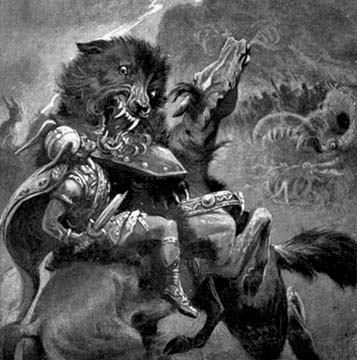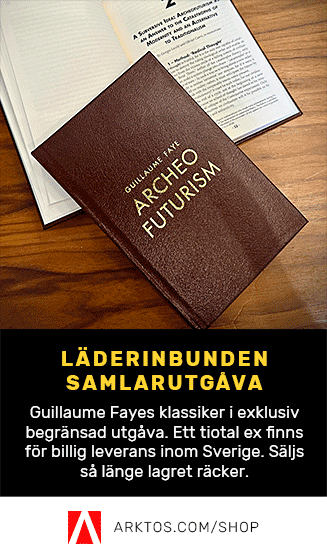Igår togs Nibelungsången upp, och där berördes våra förfäders syn på öde och heder. Ämnet är intressant och värt att tas upp närmare genom några citat.
Den germanska ödessynen har sammanfattats som en heroisk nihilism, detta då den är nihilistisk på så vis att den inser att våra liv är korta och att kosmos inte alltid är så intresserat av vad som händer med oss. Men den är också heroisk då den trots detta inte förfaller till depression eller apati, utan en vilja att möta även det oundvikliga. Arketypen för denna livssyn är asatrons gudar, och särskilt då Oden. Trots att han redan från början vet att han kommer att falla för Fenrisulvens käftar, så gör han sin plikt och rider till den sista striden; Ragnarök. Detta livsval återkommer hos varje generation av nordbor sedan tusentals år.
Den germanska ödestron har också betecknats som tragisk, då den innehåller en insikt om att allt är flyktigt, att alla våra bedrifter är kortvariga segrar som vi erövrar från ett obevekligt öde. Men trots detta kännetecknas nordbon av en vilja att göra det yttersta av sina förutsättningar, och att möta ödet med allt vad han/hon kan uppbåda. Detta innebär att det kinesiska talesättet, där man önskar sina fiender att de ”må leva i spännande tider”, är obegripligt för nordbon. Nordbon vill leva i spännande tider, och få möjligheten att pröva sin förmåga mot svåra odds, för ett kort ögonblick charma fru Fortuna. När kinesiska mödrar rådde sina barn att få ”små hjärtan”, alltså små ambitioner, är detta också något främmande för den nordiska karaktären. Detta kan vara värt att ha i åtanke när vårt samhälle rör sig allt snabbare neråt i en spiral av förfall. För det kan lätt orsaka misströstan och förtvivlan, men det är också en utmaning. Om man ska vara sann mot sig själv har man inget annat val än att följa sitt öde, i vår tid kan detta innebära att om man är en krigarnatur eller en ledare har man inget annat hedervärt val än att försvara sitt folk mot massinvandring, misär och andlig död, då detta i alla tider varit krigarens och ledarens uppgift. Sviker man denna uppgift blir livet tomt och meningslöst.
För nordbon är livet ett projekt, och kan ges en handling genom hur vi möter vårt öde. Detta uttrycks till och med i europeisk musik, som har en början, en handling och ett slut. Man kan jämföra detta med afrikansk musik, som normalt står och stampar på samma ställe.

Naumann om germansk ödessyn
I tidskriften TYR Magazines första nummer tas den germanska ödessynen upp i avsnittet Divine Traces in the Nibelungenlied av Michael Moynihan. Moynihan citerar där forskaren Hans Naumanns verk Germanischer Schicksalsglaube (Germansk ödessyn) från 1934.
Fate itself is determined and is not to be altered; indetermined and thus regulatable are only its onset and its course in their particulars, and above all the bearing of the soul maintained during its course. Often enough for the hero of the aristocratic warrior stratum, fate is simply identical with honor as a nobleman, honor of the clan, honor of the warrior – in short, with the laws of the cycle of life to which he belongs and which he cannot give up without giving up himself; which he may not deny; which he must defend or reeestablish.
My fate must become my summoning. I have to wrestle with it; through this it blesses me. I must court the contest with it like young Ekka courts his single combat with King Thidrek of Bern in the dark night in the forest by Osning, or just like a lover courts the favor of his beloved. Worry and menace turns into love and loyalty. Odin courts. Loyal to his fate up to its final fulfillment, up to the unio mystica with it – that is the highest spiritual air which can really be felt upon the earth. And thus Iring in the Nibelungenlied goes to his raging death. This is the only moment where the human becomes superhuman and becomes a god: in heroic language he is called ”hero”, in religious vernacular he is called ”saint”.
Alain de Benoist om skandinavisk syn på öde och heder
Några citat av den franske identitären Alain de Benoist (tack MS) beskriver också det hela:
Man does not suffer his fate; he can freely fulfill it, take charge of it or attempt to oppose it if he has a different idea of what it should be. […]
Destiny for the Scandinavians was not a harmful, hostile power. It is rather the entire set of authentic states that experience allows one to undergo. … It is the importance of the notion of destiny that determines that of the notion of honor and not the other way around. It is because of the fact that one has a destiny that it is dishonorable to not face it. […]
The notion of [destiny] does not entail ”obedience”, submission, or renunciation. To the contrary it stimulates the desire to take action and upholds the tragic sentiment of life. As stressed by Schopenhauer, the tragic is connected to the clear awareness man has of his weakness, the ephemeral nature of his life – and at the same time, his ceaselessly reasserted desire to compensate for this weakness with a creative intensity.
In other words, the tragic implies a will to measure oneself against time, without ever finding the slightest pretext for renouncing it in the certainty of its final outcome: death. It upholds this ”pessism of strength” that Heidegger opposed to the ”pessimism of weakness” and which ”demands awareness of the conditions and powers which, in spite of everything, secure the mastery of our historical situation”.
Heroism thus consists of struggling against what will eventually triumph – but a ”natural” triumph, to which it is always possible to oppose another specifically human triumph. It is because there is a destiny that man, by attempting to fulfill or oppose it, can be heroic, surpassing himself and partaking of divine status. Amor fati: the sole means of submitting without submitting, exaltation carried to the deepest depths of an agonistic temperament which makes struggle – starting with the struggle against oneself – the essence of life.

Nietzsche om amor fati och ödet:
Filosofen Nietzsche rörde sig också, som vanligt frestas man att säga, i närheten av en germansk inställning i denna fråga, genom sin positiva syn på det han kallar amor fati.
I want to learn more and more to see as beautiful what is necessary in things; then I shall be one of those who make things beautiful. Amor fati: let that be my love henceforth! I do not want to wage war against what is ugly. I do not want to accuse; I do not even want to accuse those who accuse. Looking away shall be my only negation. And all in all and on the whole: some day I wish to be only a Yes-sayer.
Ett äldre inlägg som tar upp den franske identitären Dominique Venners syn på determinism, fortuna och virtú, och på att göra historia:











